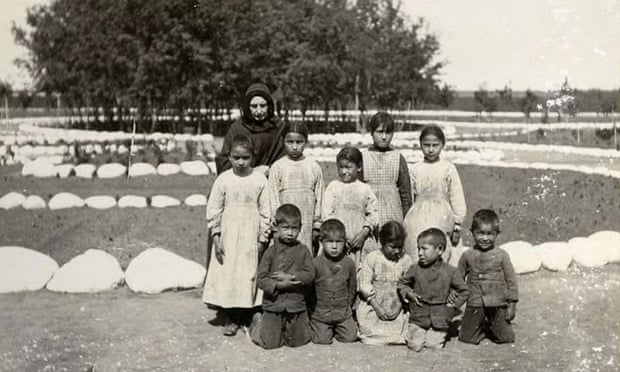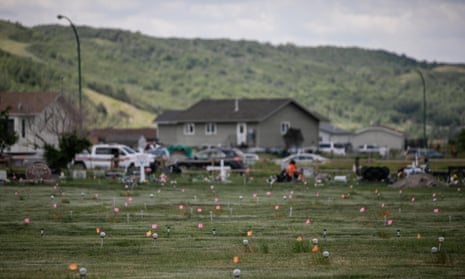Pope Francis has agreed to meet Indigenous survivors of Canada’s notorious residential schools in December, amid calls for a papal apology for the Catholic church’s role in the abuse and deaths of thousands of children.
The Canadian Conference of Catholic Bishops (CCCB) said Francis had invited delegations to the Vatican and would meet three groups – First Nations, Métis and Inuit – separately before presiding over a final audience with all three.
The Vatican did not confirm the visit, but the Holy See’s in-house news portal reported on the bishops’ statement. The CCCB said the trip was contingent on developments in the pandemic and that the delegations would include survivors of the residential schools, Indigenous elders and youths, as well as Indigenous leaders and Canadian bishops.
In recent weeks, investigators using ground-penetrating radar have reported finding hundreds of unmarked graves at the sites of three residential schools for Indigenous children. The discoveries – more than 600 graves at one school, 215 bodies at another – have revived calls, including from the prime minister, Justin Trudeau, for the pope to make a formal apology.
From the 19th century until the 1970s, more than 150,000 Indigenous children were forced to attend state-funded Christian boarding schools in an effort to assimilate them into Canadian society. Thousands of children died there of disease and other causes, and many were never returned to their families.
Quick GuideCanada's residential schools
Show

Canada's residential schools
Over the course of 100 years, more than 150,000 Indigenous children were taken from their families to attend state-funded Christian boarding schools in an effort to forcibly assimilate them into Canadian society.
They were given new names, forcibly converted to Christianity and prohibited from speaking their native languages. Thousands died of disease, neglect and suicide; many were never returned to their families.
The last residential school closed in 1996.
Nearly three-quarters of the 130 residential schools were run by Roman Catholic missionary congregations, with others operated by the Presbyterians, Anglicans and the United Church of Canada, which is today the largest Protestant denomination in the country.
In 2015, a historic Truth and Reconciliation Commission concluded that the residential school system amounted to a policy of cultural genocide.
Survivor testimony made it clear that sexual, emotional and physical abuse were rife at the schools. And the trauma suffered by students was often passed down to younger generations – a reality magnified by systemic inequities that persist across the country.
Dozens of First Nations do not have access to drinking water, and racism against Indigenous people is rampant within the healthcare system. Indigenous people are overrepresented in federal prisons and Indigenous women are killed at a rate far higher than other groups.
The commissioners identified 20 unmarked gravesites at former residential schools, but they also warned that more unidentified gravesites were yet to be found across the country.
Nearly three-quarters of the 130 residential schools were run by Roman Catholic missionary congregations, with others operated by Presbyterians, Anglicans and the United Church of Canada, which today is the largest Protestant denomination in the country.
The government formally apologised for the policy and abuses in 2008. The Presbyterian, Anglican and United churches have apologised for their roles in the abuse.
The CCCB did not mention the demand for a papal apology in the statement, saying only that Francis was “deeply committed to hearing directly from Indigenous peoples”.
It said he had personally invited the Indigenous delegations and would use the meetings for “expressing his heartfelt closeness, addressing the impact of colonisation and the role of the church in the residential school system, in the hopes of responding to the suffering of Indigenous peoples and the ongoing effects of intergenerational trauma.”
A papal apology was one of 94 recommendations from Canada’s Truth and Reconciliation Commission, but the CCCB said in 2018 that the pope could not personally apologise for the residential schools.
Pope Benedict XVI, who retired in 2013, met some former students and victims in 2009 and told them of his “personal anguish” over their suffering, but he offered no apology.
After last month’s discovery of the 215 bodies, Francis expressed his pain and pressed religious and political authorities to shed light on “this sad affair”, but he did not offer an apology either.
However, he has apologised for the sins and crimes committed by the Catholic church against Indigenous peoples during the colonial-era conquest of the Americas. He begged forgiveness during a 2015 visit to Bolivia and in the presence of Indigenous groups, suggesting that a similar in-person mea culpa could be in the offing in December.
The Canadian bishops said they hoped the meetings would “lead to a shared future of peace and harmony between Indigenous peoples and the Catholic church in Canada”.
